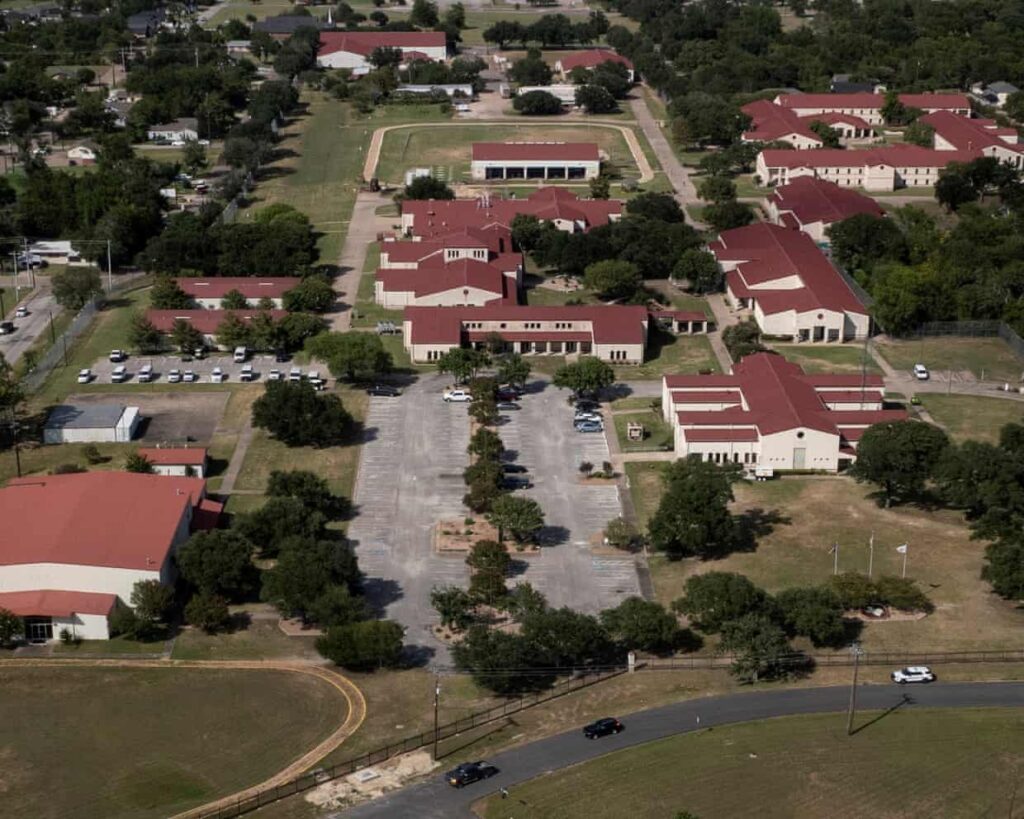
UPDATE: Ghislaine Maxwell’s transfer to a minimum security prison in Texas has just ignited intense speculation regarding her cooperation with federal authorities. Maxwell, convicted for her role in Jeffrey Epstein’s sex trafficking ring, was moved from a Florida penitentiary to the more lenient FPC Bryan last week, raising eyebrows and prompting urgent questions about potential implications for the Epstein investigation.
Observers are questioning the timing of this relocation, which occurred shortly after Maxwell’s meeting with Deputy Attorney General Todd Blanche. Critics are labeling this move a “cover-up,” as two of Epstein’s victims express concerns over the implications of her improved prison conditions. This meeting coincided with growing scrutiny over the lack of transparency surrounding Epstein’s case and Donald Trump’s past associations with the financier.
Maxwell, found guilty in December 2021 of luring underage girls into Epstein’s abusive network, is now in a facility known for its relaxed environment and notable inmates. Legal experts suggest this transfer could signal either her cooperation with investigators or a potential quid pro quo with the Justice Department. “If it walks like a duck, if it quacks like a duck, it’s probably a duck,” stated defense attorney Randy Zelin, emphasizing the unusual nature of her transfer.
On July 25, 2023, the House Oversight Committee subpoenaed Trump’s Justice Department for files related to the Epstein investigation, heightening the urgency of the situation. Speculation is rife that Maxwell’s cooperation could lead to significant developments, including the possibility of a pardon or reduced sentence. Legal professionals argue that her relocation may be a reward for providing valuable information to authorities.
“This is the beginning, not the end,” Zelin added, hinting at more forthcoming revelations.
Maxwell’s transfer raises critical questions about the integrity of the Justice Department, especially given the political ramifications surrounding Trump’s earlier promises to release Epstein-related files. The former president’s ties to Epstein have been scrutinized, with reports indicating that Trump contributed a letter to Epstein’s birthday book, further complicating the narrative.
Maxwell’s new accommodations have sparked a debate over the treatment of high-profile inmates and the potential ramifications of her cooperation. Criminal defense attorney Sam Bassett notes that the public nature of Maxwell’s recent meetings suggests a strategic move aimed at influencing political considerations regarding her future.
“It’s unusual for someone convicted of such serious crimes to be transferred to a minimum security facility,” Bassett remarked, raising concerns about the implications of her improved conditions. Legal experts note that such privileges are typically reserved for inmates deemed to be cooperating with law enforcement.
As the situation develops, Maxwell’s fate could hinge on her ability to provide information that implicates others, potentially reshaping the landscape of ongoing investigations into Epstein’s network. The Bureau of Prisons has not yet commented on the specifics of her transfer, but officials have stated that prisoner relocations often occur for safety reasons, including threats at previous facilities.
Maxwell’s relocation is not just a personal milestone; it signals a potential shift in the broader narrative surrounding Epstein’s crimes. Legal analysts are closely monitoring the situation as it unfolds, with many anticipating key disclosures that could emerge from her cooperation.
As public interest surges, the implications of Maxwell’s transfer continue to reverberate across political and legal arenas. With the House Oversight Committee’s investigation underway and ongoing scrutiny of Trump’s administration, the ramifications of this case are expected to unfold rapidly in the coming weeks. Stay tuned for further updates as this urgent story develops.





